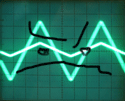|
sounds like their problem to me
|
|
|
|

|
| # ? May 15, 2024 08:52 |
|
I've now reached the stage of madness where one becomes convinced that the termination provided by attaching a scope probe is fixing everything on the bus it almost makes sense if you forget that it's an I2C bus running at 3.3V and 10kHz and shouldn't be anywhere near that sensitive
|
|
|
|
try sticking a lil cap on the bus and see if that fixes it
|
|
|
|
Bloody posted:try sticking a lil cap on the bus and see if that fixes it yeah, maybe its smoothing out a glitch, noise or something? check the capacitance of the probe and add that. be careful tho not to blow out the capacitance budget, iirc the max capacitance allowed on a i2c bus is something like 400pF.
|
|
|
|
Barnyard Protein posted:yeah dsp is awesome. what area of dsp are you interested in? i'm trying to learn it on my own, focusing on fast algorithm implementation. i wish i were in a position to go back to grad school full time, i'd do dsp. Tangent bump: This is the best book on DSP I have literally ever read - I refer back to it almost every time I need to implement something tricky: http://www.amazon.com/Understanding-Digital-Signal-Processing-Edition/dp/0137027419 What's great about it is that the book isn't academic at all. It targets the working engineer (me) who's way too lazy to digest a bunch of math just to get to a conclusion (also me) Poopernickel fucked around with this message at 20:47 on Feb 21, 2016 |
|
|
|
yeah, a few days ago we figured out it was the capacitance weirdly although the probes were only rated at 12pF they were more effective at preventing glitches than an 18pF cap connected closer to the problem area
|
|
|
|
DuckConference posted:yeah, a few days ago we figured out it was the capacitance a probe and a cap with the same capacitance values will have different frequency responses, although i have no idea how that would play into fixing your problem. Jerry Bindle fucked around with this message at 18:44 on Feb 22, 2016 |
|
|
|
Poopernickel posted:Tangent bump: This is the best book on DSP I have literally ever read - I refer back to it almost every time I need to implement something tricky: This book is great, found something immediately useful, 10.9 accurate adc testing. Never thought to do that, hah!
|
|
|
|
Poopernickel posted:Tangent bump: This is the best book on DSP I have literally ever read - I refer back to it almost every time I need to implement something tricky: yeah this book is dope, i'm using it in addition to the main course textbook (oppenheim and schafer) DuckConference posted:I've now reached the stage of madness where one becomes convinced that the termination provided by attaching a scope probe is fixing everything on the bus add the scope probe equivalent circuit to your schematic and it should make sense the fact you need that filter on the line is weird as hell. are your reflections / ringing that bad that devices are seeing double-clocks?
|
|
|
|
movax posted:add the scope probe equivalent circuit to your schematic and it should make sense no idea, the clock/data lines always looked pretty drat clean, even with a differential probe. the lines run pretty close to a high speed lvds pair and some traces for a 12V RS232 line so there are some plausible sources of noise, but I was never able to actually see any glitches
|
|
|
|
do you have any termination on the lines? oh wait this is 3.3v super slow i2c isnt it nevermind
|
|
|
|
do you have pull up resistors dont use i2c
|
|
|
|
looking at the captures from the diff probe, the capacitance does clean the bus up a decent amount it's just that the dirtier signal shouldn't have been a problem unless the i2c slave devices were way shittier than advertised with much less input hysteresis than listed in the datasheet oh well, it works now, so once the current stock is modded and the pcb design changed I'll forget about it and see if it ever blows up in my face again
|
|
|
|
a datasheet lied
|
|
|
|
JawnV6 posted:a datasheet lied well yeah but you would think "can handle like <100mV of noise on a 3.3V bus" would be something you could trust
|
|
|
|
can't remember if it was this thread or another one, but a while back there was a guy posting about how he was doing something with an ATMega that wasn't supposed to be possible according to the datasheet. getting a timer signal on a pin that didn't support it or whatever. he contacts atmel to ask is this normal behavior? and they go no, that's impossible, you must be measuring something wrong. he keeps at it for a while and it sure seems like it's working but atmel maintains that it's not possible for the chip to do that. eventually they agree to test it at their facility, and they reproduce the working behavior. so they dig up the original chip design and trace it, and a couple weeks later he gets an email from them saying whoops, we were wrong, turns out the chip actually can do what you've been making it do, good to know
|
|
|
|
DuckConference posted:well yeah but you would think "can handle like <100mV of noise on a 3.3V bus" would be something you could trust that was probably their target...
|
|
|
|
hobbesmaster posted:that was probably their target... also that's a lot of noise
|
|
|
|
I am not really an audio guy but I have a project where I have multiple light organs (XLO-5 from xkitz.com) and one works great, but as soon as I try to split a LINE IN to feed more than one at a time I get unusual behaviour. With one hooked up it's fine. With two they should display the same light pattern but they don't, and I don't seem to get good response from either. With three or four connected I just get lights kind of always blinking on, unrelated to the input. I am pretty sure I am being super dumb about something, but I don't know what. I'm thinking buffer the audio signal but that's probably just digital electron janitor thinking. Am I stupid to even think of splitting a single line level input across several pieces of hardware?
|
|
|
|
Mister Sinewave posted:I am not really an audio guy but I have a project where I have multiple light organs (XLO-5 from xkitz.com) and one works great, but as soon as I try to split a LINE IN to feed more than one at a time I get unusual behaviour. With one hooked up it's fine. With two they should display the same light pattern but they don't, and I don't seem to get good response from either. With three or four connected I just get lights kind of always blinking on, unrelated to the input. it depends on the input impedance of the light organ, i guess. a buffer should sort you out, yeah. if the first stage of the light organ is an opamp or a cs amp or something, it should not have those issues. i have no idea how those are designed though a quad opamp is like... 20 cents to 2 dollars, depending, so the pragmatist in me is like "yeah just buffer it; it should solve the problem" although i am curious what they are doing to cause that kind of behavior
|
|
|
|
DuckConference posted:I've now reached the stage of madness where one becomes convinced that the termination provided by attaching a scope probe is fixing everything on the bus I watched a talk by an integrated circuit professor where he claimed that the first integrated circuit only worked when you stuck the oscilloscope probe on the output. The professor reverse engineered the circuit, noticed this, and asked the engineer at Texas Instruments who got the Nobel Prize for designing the first IC about it, and the guy quickly changed the subject. silence_kit fucked around with this message at 16:58 on Mar 4, 2016 |
|
|
|
Raluek posted:it depends on the input impedance of the light organ, i guess. a buffer should sort you out, yeah. if the first stage of the light organ is an opamp or a cs amp or something, it should not have those issues. i have no idea how those are designed though They do have the schematics for their thing online so I'll see if I can learn anything. Looks like their LINE IN goes through some voltage dividers then feeds into a FET then opamps. I'm going to try a couple things and go from there. Failing that, breadboard up an opamp buffer (which I'm guessing is basically an opamp with a gain of 1). Pointers are welcome because I'm out of my area here, either way I'll likely learn something but not definitely
|
|
|
|
silence_kit posted:I watched a talk by an integrated circuit professor where he claimed that the first integrated circuit only worked when you stuck the oscilloscope probe on the output. The professor reverse engineered the circuit, noticed this, and asked the engineer at Texas Instruments who got the Nobel Prize for designing the first IC about it, and the guy quickly changed the subject. the navy seal then punched the professor in the face for doubting kilby
|
|
|
|
i know its not the point silence kit was making, but IC's do need to be biased properly to function. his first IC was just a transistor with some biasing resistors wasn't it? it'd be pretty dopey of someone to claim it didn't work just from not being able to replicate what must be a really finicky circuit. it looks like a peanut-butter and germanium sandwich on rye.
|
|
|
|
Barnyard Protein posted:it looks like a peanut-butter and germanium sandwich on rye. intel getting into some exotic materials to keep moore's law going there's been a lot of articles on the death of moore's law recently, but it's sounding more plausible that they're right. this time it's not so much based on the physics but on the economic argument that no one can afford the fabs anymore then again there was all the angst about 28nm being the cheapest per transistor and things going up from there and yet now there is tons of poo poo using 14/16 finfet supposedly the reason people want iot to be real is that without an absolutely ginormous market for chips (like an order of magnitude bigger than smartphones) there wouldn't be enough customers to fill a fab a few nodes from now
|
|
|
|
also if it was Shockley he literally wouldn't know
|
|
|
|
DuckConference posted:intel getting into some exotic materials to keep moore's law going the economies of scale will prob keep working
|
|
|
|
DuckConference posted:the economic argument that no one can afford the fabs anymore
|
|
|
|
demand for intel server parts is so alarmingly high that i dont believe that
|
|
|
|
doesn't justify a fab on it's own though
|
|
|
|
nationalize the semiconductor industry
|
|
|
|
DuckConference posted:supposedly the reason people want iot to be real is that without an absolutely ginormous market for chips (like an order of magnitude bigger than smartphones) there wouldn't be enough customers to fill a fab a few nodes from now no, the reason why people want IoT is because they are idiot shitlords who think wifi toast racks and web apps to remotely monitor your washer fluid are things people actually want
|
|
|
|
will 2016 be the year of twitter on the refrigerator? nah
|
|
|
|
Sweevo posted:no, the reason why people want IoT is because they are idiot shitlords who think wifi toast racks and web apps to remotely monitor your washer fluid are things people actually want
|
|
|
|
Bloody posted:will 2016 be the year of twitter on the refrigerator? 2014?
|
|
|
|
Sweevo posted:no, the reason why people want IoT is because they are idiot shitlords who think wifi toast racks and web apps to remotely monitor your washer fluid are things they are owed by society fixed it a lil
|
|
|
|
https://docs.google.com/presentation/d/1x7syhRv8Kxi78fpbcp4vSsslriGOj5cuHUgCUuZcZ3U/edit#slide=id.p was my determinism rant here or the Terrible thread
|
|
|
|
JawnV6 posted:https://docs.google.com/presentation/d/1x7syhRv8Kxi78fpbcp4vSsslriGOj5cuHUgCUuZcZ3U/edit#slide=id.p terrible thread
|
|
|
|
Barnyard Protein posted:i know its not the point silence kit was making, but IC's do need to be biased properly to function. his first IC was just a transistor with some biasing resistors wasn't it? it'd be pretty dopey of someone to claim it didn't work just from not being able to replicate what must be a really finicky circuit. it looks like a peanut-butter and germanium sandwich on rye. I didn't read the patent and check the professor's claims, but he said that the first IC was an oscillator circuit. I don't think that he went through the trouble of trying to reproduce the circuit--it'd be pretty impractical to do that with the exact same circuit technology. He claimed that a high value of shunt capacitance, which could be provided by an oscilloscope probe and was not shown in the patent circuit diagram, was totally necessary for the circuit to work as intended. It's just kind of an amusing story about how something held up as being a great invention was actually a flawed demonstration.
|
|
|
|

|
| # ? May 15, 2024 08:52 |
|
Bloody posted:will 2016 be the year of twitter on the refrigerator? more likely tha Linux on the desktop
|
|
|
























